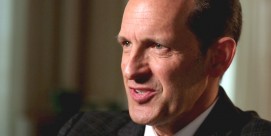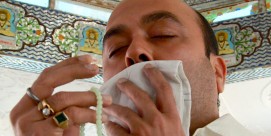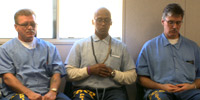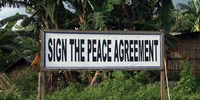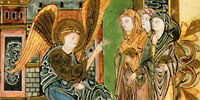In This Episode << SLIDE LEFT TO SEE ADDITIONAL SEGMENTS
The Rev. Christian Fuhrer Extended Interview
Read a translation of the Religion & Ethics NewsWeekly interview at St. Nikolai Church in Leipzig with Pastor Christian Fuhrer:
In East Germany, the church provided the only free space in connection with the groups—people who wanted to discuss topics that were taboo, such as the refusal to serve in the army, military education. Everything that could not be discussed in public could be discussed in church, and in this way the church represented a unique spiritual and physical space in East Germany in which people were free.
Here [at St. Nikolai Church in Leipzig] we have said peace prayers since 1981 and every Monday since 1982. That was something very special in East Germany. Here a critical mass grew under the roof of the church—young people, Christians and non-Christians, and later those who wanted to leave [East Germany] joined us and sought refuge here. The church became a very special place, and in particular the Nikolai Church, which we could describe like this: the church was finally on the side of the Lord, on Jesus’ side. In other words, it was on the side of the oppressed and not on that of the oppressors, with the people and not with those who had the power. The special experience we had here was that the people accepted Jesus’ message, especially the message of the Sermon on the Mount. We experienced in a very special way that everything that is written here is true. If you don’t believe, you won’t stay. The “comrades” did not believe, and they did not stay. “Not by might, nor by power, but by my spirit.” “He pulls the powerful from their throne and lifts up the poor.” “Blessed are the meek, for they shall inherit the earth.” We experienced it just like that—the church as a refuge and a place for change, Jesus’ Sermon on the Mount, no mention of paradise and redemption, but the daily bread in the reality of political hopelessness.
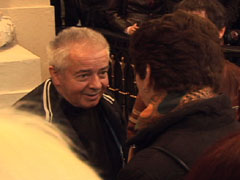 Pastor Christian Fuhrer |
The special experience that we had during the years of peace prayers and then with this massive number of non-Christians in the church, which was exceptional, was that they accepted the message of Jesus. They grew up in two consecutive atheist dictatorships. They grew up with the Nazis who were preaching racism, the master race, prepared for war, and replaced God with Providence, as Hitler liked to say. They also grew up with the Socialists preaching class struggle and vilified the church by saying Jesus never existed, that’s all nonsense and fairy tales, legends, and your talk about nonviolence is dangerous idealism; what counts is politics, money, the army, the economy, the media. Everything else is nonsense. And the people who were brainwashed like this for years and grew up with that. The fact that they accepted Jesus’ message of the Sermon on the Mount, that they summarized it in two words—no violence—and the fact that they did not only think and say it, but also practiced it consistently in the street was an incredible development, an unprecedented development in German history. If any event ever merited the description of “miracle” that was it: a revolution that succeeded, a revolution that grew out of the church, remained nonviolent, no broken windows, no people beaten, no people killed—an unprecedented development in German history. A peaceful revolution, a revolution that came out of the church. It is astonishing that God let us succeed with this revolution. After all the violence that Germany brought to the world in the two wars during the last century, especially the violence against the people from whom Jesus was born, a horrible violence, and now this wonderful result, a unique, positive development in German history. That is why we are so happy that the church was able to play this role and enabled this peaceful revolution.
The most important thing for us was the power of prayer, which is still true today. We are not praying to the air or to the wall, but to a living God. We did not pray for the wall to come down. It was more comprehensive: [We were praying] for peace, justice, and the preservation of our creation. We addressed the very specific needs of human beings in our prayers, and God has blessed those prayers in such a way that nobody could have predicted. We went on, step by step. It got bigger and bigger, and in the end the prayers prevented us from drowning in fear and gave us the strength to face the opposition outside. In other words, more and more protests came from the church and spilled onto the street, combined with the strength that we got from our faith. The fear was very powerful, but our faith was more powerful than the fear, and the prayers gave us the strength to act. That is still the same today.
What motivated me was Jesus’ saying “You are the salt of the earth,” which means that you must get involved; you cannot stay in your church. You must get involved in this situation; the salt must be inserted in the wound, in the place that is not in order, that is sick. That’s where you must go. This thought to get involved in politics is a thought that Jesus already voiced in the parable of the Good Samaritan. Someone is beaten and lies there, those who beat him are gone, and now two people coming from temple are approaching, are looking the other way and walking away. Jesus says that they are guilty, not because—they did not do anything, they did not beat him, but they did not help him. If we just leave the world alone and do not get involved, we are just as guilty as those two, as Jesus said in that parable, who looked the other way and did not want to hear about it. You must get involved, because you are the salt of the earth.
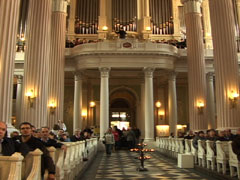 St. Nikolai Church |
[Dietrich] Bonhoeffer really impressed me with his philosophy in approaching the atheist, the non-Christian, with the Christian message in a way that is easy to understand. I first learned that from Jesus—the simple language. Jesus did not speak the language of the temple, but the language of the people. He talked about the mustard seed, the farmer, the worker in the vineyard, the jobless who are waiting in the marketplace, hoping to get hired. Those are all things that people can understand, and then he introduced the message of God’s love into this clear language. And Bonheffer said that we should apply Jesus’ language in such a way that it can be understood even if you were not born into the Christian tradition or into a Christian household. That was really impressive. In addition, the examples impressed me very much, the fact that people applied the Sermon on the Mount one-to-one. First, to put Christians to shame, it was a non-Christian and Hindu who did it: Mahatma Gandhi. Very much in the spirit of the Sermon of the Mount, he engaged in nonviolent resistance and freed his people from British colonialism, but gave his life for it, as did Jesus. He was shot in 1948. The second one was, thank God, a Christian: Martin Luther King. He prepared and executed this idea of nonviolence, peaceful resistance, in a wonderful way. It was a very tense situation, and the fact that it was possible for an African-American to become president of the United States today even exceeds Martin Luther King’s dream. Then it became our turn to apply the teachings of the Sermon of the Mount here in Leipzig. But you cannot forget to mention Nelson Mandela and Bishop Desmond Tutu. They have always impressed us. We felt that we were walking together with them to fulfill Jesus’ legacy.
The police were always very violent, especially on October 7th when they beat hundreds of people. With this violence they wanted to prevent people from gathering here, here in the church and on the plaza. They gradually increased the amount of violence, but achieved the opposite of what they expected. Especially on October 9th, they had created such a frightful scenario that they thought people would not dare show up here. Instead, even more people came. In church people had learned to turn fear into courage, to overcome the fear and to hope, to have strength, as I mentioned before. That was very important, and during those years and in particular during this frightful time, people overcame their fear. They did not bring their children, because you had to fear for your life. The children stayed at home. They came to church and then started walking, and since they did not do anything violent, the police were not allowed to take action. “We were ready for anything, except for candles and prayer,” they said. If the first group had attacked the police, the police would have known exactly what to do. You can see it on TV every night how police and armies react to demonstrators. That did not happen, and the officers and generals called Berlin and asked what they should do, but they did not get any instructions. Those in Berlin did not say anything, the officers here did not do anything, and thus the movement that did not result in any violence, as the people learned in church, began to spread, and that is when the following became clear in East Germany: This is the beginning of the end of East Germany. It cannot go on, the people got what they wanted. Peace prayers were held all over the country. When they saw the images from Leipzig on October 9th, they started demonstrations everywhere else. The crowds became larger and larger, and then [Erich] Honecker handed in his resignation, and on the 18th the politburo resigned. On November 9th, on this very important day, on this day the wall was overcome from the East. Those are experiences that you cannot learn in college, and I would like to summarize them as follows: the Nikolai Church was open to everyone. The church was open to all people, no matter if they were Christian or non-Christian. The next thing is that throne and altar do not belong together. That is a huge mistake that the church made during the past century. No, the street and the altar belong together, just as Jesus did not hide in the temple, but was mingling out in the street, in the houses and on the plazas. We as a church must go into the street and let the street come into the church. The church must be open to everyone. We can teach nonviolence as a practical application of the Sermon on the Mount, turn swords into ploughshares as in the Old Testament, open to all, as mentioned before, and we are the people. We have to learn to have a certain self-confidence, overcome fear, find our voice once again in church, approach bad situations with this self-confidence, be able to make changes within society, reject injustice, and refuse to go along, and I think what is important in all of that is the power of prayer. Without prayer we would not have changed anything, we would not have been able to overcome fear, we would not have had the strength to change things and to take the message of the Bible seriously, being able to interject yourself into a social reality, finding the message of Jesus and the Bible and applying it to the current situation, not uttering long sentences but finding the right word for the right situation, knowing how to act. For me the main criterion for action was: What would Jesus say in this situation? Then I came to the conclusion that we needed to do it the same way he would have done it.
The role of the church did not diminish, at least not here in the Nikolai Church. It continued. Huge protests against the war in Iraq, peace prayers involving many people to save jobs…It continued, but under different social circumstances. However, there are always certain peaks, unique times, such as October 9th. It was a peaceful revolution which was a unique process. You cannot expect that it will go on like that every day. What this revolution aimed to achieve was indeed achieved, and then people stepped back. The important thing to remember is that we did not do that to get people to join our church, but because it was necessary. That is what Jesus did as well. When he provided help, he never asked if that person went to the temple or if that person said all his prayers. He just realized that this human being needed help, so he helped. That is exactly how we did it. We never said “but you must return the favor,” the way it is done in politics and in the world. We created something, and the blessing continued for the people. The most important thing is that the church has to remain open. Whenever people need the church again, in everyday life or in very specific situations, they should find the church open. The church should be there for the people, the way Jesus intended. An inviting, open church without the expectation that people join; an inviting, open church offering unconditional love, just as Jesus did, and [we must] act in this spirit.

